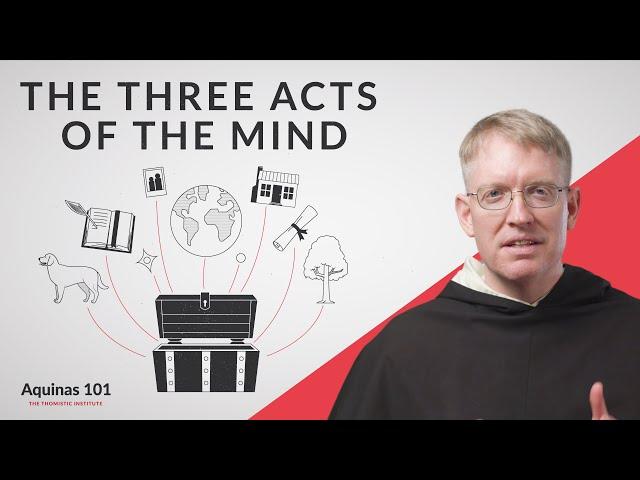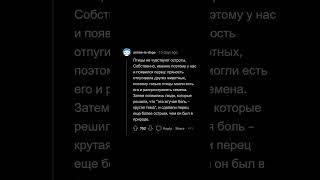
The Three Acts of the Mind (Aquinas 101)
Комментарии:

Beautiful ! Thnak you so much.
Ответить
Thank you so much for making all this accessible!
Ответить
anyone here from st. t?
Ответить
Thank you, Father. It's very helpful and interesting. Keep up the good work! God bless.
Ответить
Great Video 👌
Ответить
At 1.01 in this item on how the human mind can assimilate reality there's a graphic of a sun-centred system. Of course, Aquinas perceived this entirely wrongly because he thought he observed as reality, a tiny earth-centred universe. Perhaps not a good illustration in this topic.
Ответить
Amazing! Aquinas is God's gift to us all. St. Thomas of Aq. Pray for us!
Ответить
We can know.
Apprehension - reception of forms( mind becomes the forms it apprehends)
Judgement - whether something is or not so( Affirm or deny something)
Reason from a set of judgements to a conclusion

'The mind becomes the form' sounds strange to me. Is this different from saying that the the mind abstracts the form from the particular, so that 'the universal form exists in the intellect'?
Ответить
Beautifully told n facinating to hear
Ответить
DOGMA! I KNOW
SHUT UP

I have a question about aristotelian-thomistic epistemology/metaphysics, as I'm not so familiar with it. If to know something is equivalent to grasping its form, then how does Aristotle explain the knowledge of particulars? We know specific dogs and specific objects. They are form-matter composites, so how can we know them by grasping their form? Doesn't that only explain how we know universals? Or is knowledge of particulars different from the one described here?
Ответить
It does matter what you think!
Ответить
Great video
Ответить
My Logic subject has become more interesting now that I found Aquinas also has a take on the three activities of the mind.
Ответить
Thank you for explaining this, it really helped. One question though, why are you wearing a Harry Potter cape?
Ответить
Thank you for this video!
May our Lord Jesus Christ bless you!

Amazing! Thanks, TI!
Ответить
Brilliant. As always.
Ответить
I read also that Christianity is a synthesis of Plato’s ideal world of forms and Aristotle’s dialectical classifications. In this way Christ can be seen as the synthesis of Plato’s epistemology (divine nature ascending into heaven) and Aristotle’s empirical classification (living and dying on earth). Having a science, background, I like reading the doubting Thomas story as an Aristotelian empirical experiment!
Ответить
❤
Ответить
Be still......
Ответить
Truth
Ответить
Thank you thank you thank you
Ответить
Thank you so much for the insightful video!
Ответить
Absolute gibberish. What on earth makes you think you can speak with authority about psychology?
Ответить
Romans 10:13
“For whosoever shall call upon the name of the Lord shall be saved.”

@ThomisticInstitute You mention our 'experience', is our awareness of that experience a function of the intellect ?
Ответить
What about intuition? Is that not an act of the mind as well?
Ответить
Thanks for this videos very simple the Philosophy and teachings of the Summa Theologica of St Thomas Aquainas is made simple and understandable to young and old Catholics all over the World! There’s a study a survey all over the world of what are the regrets of a dying person in his death bed there are just only two That they have Love a little and travelled a little! To maximize our happiness and experience in this world we have to strive to achieve these two things k!
Ответить
Here is a philosophical critique of the video on the three acts of the mind according to Aquinas:
The video provides a clear, succinct overview of Aquinas' perspective on the three basic acts of the mind - understanding, judgment, and reasoning. However, a more robust philosophical analysis could have strengthened the arguments.
For example, the relationship between understanding and judgment could be explored further. Aquinas sees understanding as apprehending conceptual truths while judgment affirms or denies the relationship between concepts. But does understanding require some implicit judgment, or are these faculties distinct? More philosophical parsing of this relationship is needed.
Additionally, the role of reasoning in moving from premises to conclusions deserved more attention. Aquinas saw this as "discursive" thinking, but how does the mind make logical inferences? What is the philosophical mechanism of deductive reasoning? This act of the mind is complex.
Some reference to potential criticisms or alternatives could also bolster the video. Aquinas' threefold view of mental acts is rooted in Aristotle's philosophy. Analyzing differences with modern cognitive science or the role of intuition along with deduction would make the video more thorough philosophically.
As a very brief introduction, the video captures Aquinas' basic view of the human mind. But further philosophical exploration of the nuances in his thought and how it relates to alternative theories of cognition would enhance the analysis while demonstrating the enduring significance of Aquinas. More rigor is needed to make this overview of genuine philosophical value.

Actually, reasoning is the process of coming to a judgment,
Ответить
This was a great one
Ответить
My mind is correlating this with Jung’s cognitive functions. I wonder if he got it from Aquinas.
Ответить
But, How do we know we become forms in thought? It's an assertion with no evidentiary proof
Ответить
In his Prooemium, before the start of his Commentary on Aristotle's "Posterior Analytics", Thomas Aquinas points out that Aristotle's logical treatises of the "Categories", "On Interpretation", and the "Prior"/"Posterior Analytics" correspond to and are to guide the acts of apprehension, judgment, and reasoning respectively. If you are interested in reading Aquinas and Aristotle, I recommend referring back to the Prooemium throughout your readings (it's only a few paragraphs long but really helpful in clarifying what Aristotle is treating in his works!).
Ответить

























